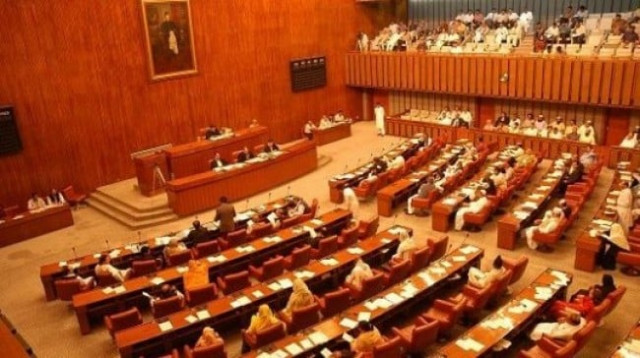Committee members criticized the NCCIA for failing to act despite multiple complaints.
Cyber fraud targeting MPs and the ongoing controversy over data breaches dominated discussions during a meeting of the Senate Standing Committee, which met on Thursday.
The panel, chaired by Senator Faisal Saleem Rehman, was briefed in detail by National Cyber Crime Investigation Agency (NCCIA) Director General Syed Khurram Ali. The report addressed corruption within the NCCIA, allegations of bribery against officials and abuse of authority. Sensitive parts of the agenda, including the illegal online sale of Pakistani citizens’ data, were kept private.
Following the emergence of a corruption scandal involving some NCCIA officials, Khurram Ali was appointed as the new director general on November 2.
The meeting took a dramatic turn when several senators revealed that they had been defrauded by online scammers. Four senators (Bilal Khan Mandokhail, Saifullah Abro, Dilawar Khan and Falak Naz) revealed that they had been victims of scammers posing as officials or acquaintances.
“I also received a call from these scammers,” said committee chairman Senator Faisal Saleem Rehman.
Read: The cybercrime watchdog will reopen all investigations
Senator Saifullah Abro said hackers typically demanded between Rs 500,000 and Rs 550,000, while Senator Falak Naz reported being defrauded of Rs 500,000 in two payments. Senator Dilawar Khan lost Rs 850,000 in an online transaction.
Senator Naz told the committee that the callers had detailed knowledge of her family and personal details, adding that the scammers had posed as representatives of a “counseling centre”. Members criticized the National Cyber Crime Investigation Agency (NCCIA) for failing to act despite multiple complaints.
During the meeting, the issue of the leakage of citizens’ personal data on the Internet was also addressed. Senator Faisal Saleem Rehman asked NCCIA officials what steps had been taken to address the violation.
NCCIA Director General Syed Khurram Ali said several FIRs had been registered and 851 suspects had been arrested. It added that it was coordinating with telecommunications companies, whose systems were also being audited, and that resolving the matter could take up to three months.
Read more: 139 platforms dedicated to the business of data sales unmasked
The investigation was launched after Express News first reported on the sale of citizen data last year, in 2024, and again on September 7 of this year, when it issued another report exposing a new leak. Subsequently, Home Minister Syed Mohsin Naqvi took notice and ordered a thorough investigation and ordered those responsible to be brought to justice.
In September, the PTA blocked 1,372 sites, apps and social media pages involved in the sale or sharing of personal data. The Ministry of Home Affairs had formed an inquiry committee to investigate the matter.
However, confusion arose when Senator Palwasha Khan questioned the progress of a ministerial inquiry committee announced earlier by the Home Minister to investigate the data leaks. Both the Special Secretary for Home Affairs and DG NCCIA claimed that they were not aware of the existence of any such committee, causing serious concern among senators.
Data leaks
Thousands of Pakistanis, including federal ministers and senior officials, had reportedly been affected by a breach of personal data, available for sale online, Express News reported on September 7.
Also read: Billion-dollar digital fraud: call for effective cyber governance
The data available for purchase included addresses of mobile SIM owners, call logs, copies of national identity cards and details of foreign travel. The records cover a wide range of people, from federal ministers to PTA spokespersons, and extend to all levels of government.
Despite a similar warning issued by Express News on October 12 last year, the illicit trade continued and weak law enforcement failed to stop the leak. Authorities, including the PTA and NCCIA, remained largely silent, despite assurances that the offending websites were shut down.




